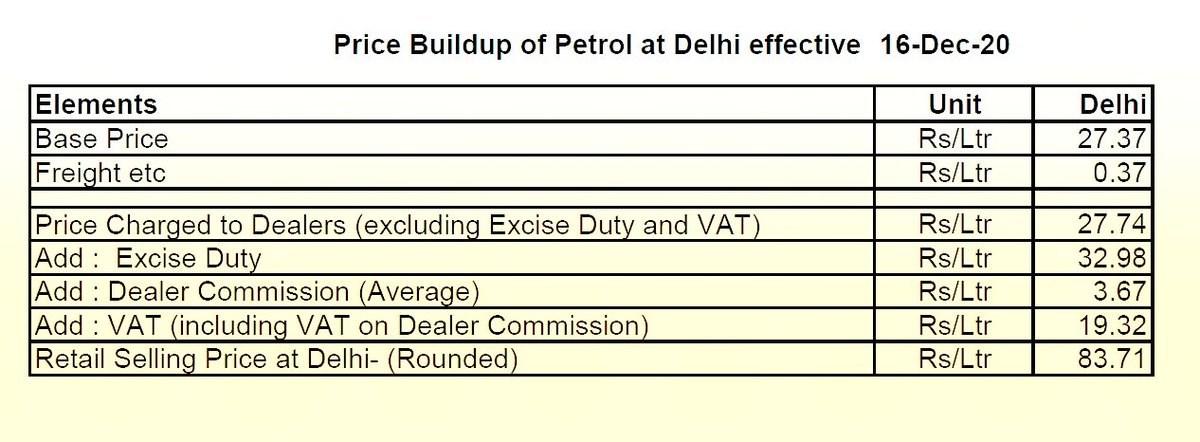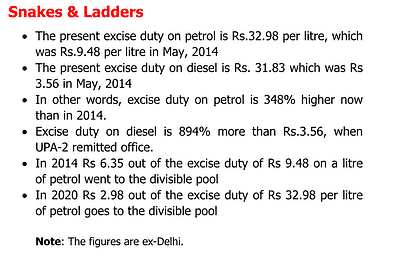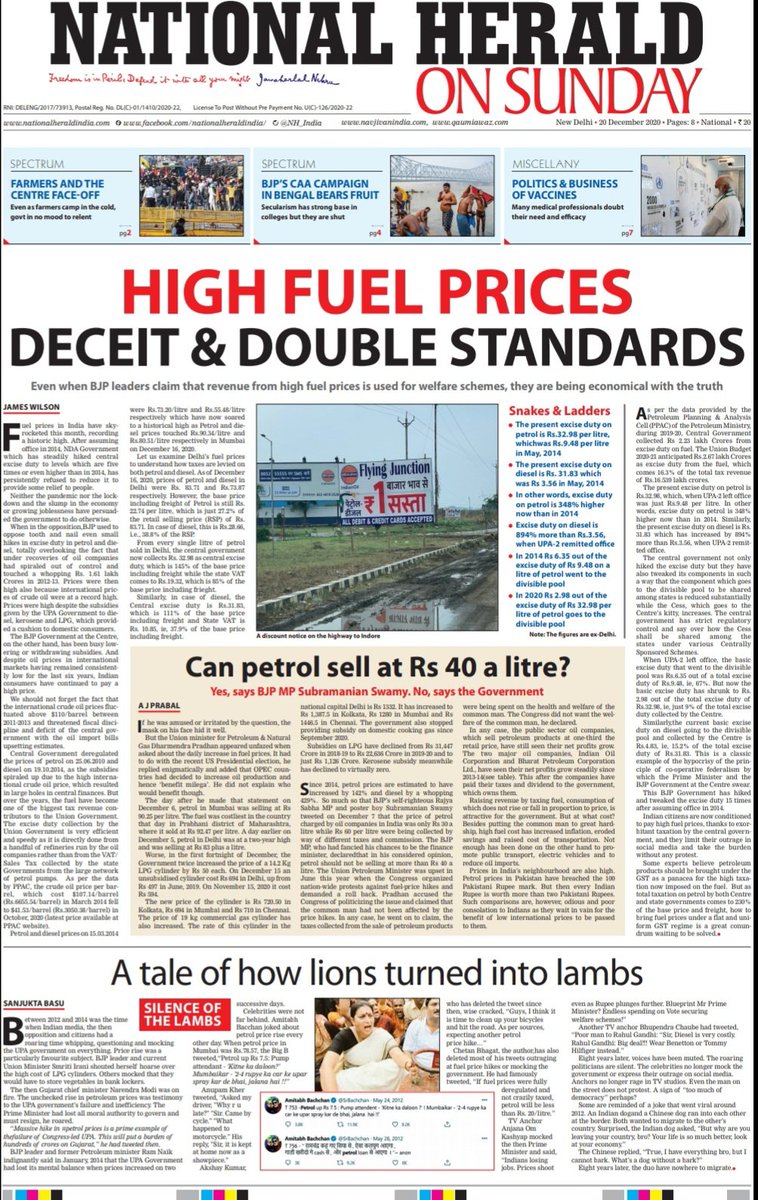
Here is my article on the great fuel loot!
When #BJP leaders claim that revenue from #fuelprices is used for welfare schemes, they are being economical with the truth.
What is more, the share of states from tax on fuel has steadily gone down
nationalheraldindia.com/india/high-fue…
When #BJP leaders claim that revenue from #fuelprices is used for welfare schemes, they are being economical with the truth.
What is more, the share of states from tax on fuel has steadily gone down
nationalheraldindia.com/india/high-fue…
Present excise duty on petrol is Rs.32.98, which, when UPA-2 left office was just Rs.9.48 per litre. In other words, excise duty on petrol is 348% higher now than in 2014.
Also, the present excise duty on diesel is Rs. 31.83 which has increased by 894% more than Rs.3.56 in 2014
Also, the present excise duty on diesel is Rs. 31.83 which has increased by 894% more than Rs.3.56 in 2014
Indian citizens are now conditioned to pay high fuel prices, thanks to exorbitant taxation by the central government, and they limit their outrage in social media and take the burden without any protest.
PS: For the ones, who are asking me from where we will get historical data on taxation changes?
Its not available directly from PPAC website as they only give split up of current tariff. They shown empty hands to RTI too.
I used to log duty changes since 2010 religiously ;)
Its not available directly from PPAC website as they only give split up of current tariff. They shown empty hands to RTI too.
I used to log duty changes since 2010 religiously ;)
For one of my RTI to the Revenue Department on total amount received as Basic Excise and other two cess components, they kicked my RTI query like a football to more than a dozen directorates too 😀
It is not easy to catch as old data is purged, so that comparisons are difficult
It is not easy to catch as old data is purged, so that comparisons are difficult
One important data point off late completely purged by PPAC is the price comparison of fuel with our neighbouring countries, as we started to squeeze the throat of citizens, they stopped publishing it to escape from eggs on the face!
U may recall the "factoids & super lies" circulated by Amittu's notorious IT cell as global oil prices in WhatsApp & Facebook during MMS times, when international oil prices hit the roof.
Nowadays I miss those memes forwarded nonstop. Now its loot is painted as nation building!
Nowadays I miss those memes forwarded nonstop. Now its loot is painted as nation building!
As couple of friends pointed out that base price plus freight, Central Taxes and State VAT/Sales Tax when add up do not match with Retail Selling Price.
There is dealer's commission too, which I did not discuss here. Please see the split by IOC
There is dealer's commission too, which I did not discuss here. Please see the split by IOC

Thank you so much for the overwhelming response to my article on #GreatFuelLoot.
This one got more than 2.2 lakh impressions, more than 700 RTs, around 1400 likes and around 40 Quotes.
Thank you all who emailed & DM me to appreciate 🙏
This one got more than 2.2 lakh impressions, more than 700 RTs, around 1400 likes and around 40 Quotes.
Thank you all who emailed & DM me to appreciate 🙏

My special thanks to:
@TRBRajaa @SalmanSoz @srajagopalan @RURALINDIA @asadowaisi @praxpriya @RijoMJohn @sonaliranade @OmairTAhmad @suchitrav @srivatsayb @ramakumarr @RemaNagarajan and many other friends, who appreciated and given more visibility to this article. Thank you all 🙏
@TRBRajaa @SalmanSoz @srajagopalan @RURALINDIA @asadowaisi @praxpriya @RijoMJohn @sonaliranade @OmairTAhmad @suchitrav @srivatsayb @ramakumarr @RemaNagarajan and many other friends, who appreciated and given more visibility to this article. Thank you all 🙏
Thank you @chatukhor who always pull me from my lazy writer avatar to write something for him.
His warmth, sincerity and affection force me to concede to his requests. It is so difficult to say NO to him 😊😍
His warmth, sincerity and affection force me to concede to his requests. It is so difficult to say NO to him 😊😍
Also thanks to @rwac48 @churumuri @digitaldutta @Shehla_Rashid @suresh_ediga @ikaveri @jay_ambadi
and many other friends, who always encourage & inspire.
Everyone of you deserve special thanks and mention too. Thanks once again 🙏💐💐💐
and many other friends, who always encourage & inspire.
Everyone of you deserve special thanks and mention too. Thanks once again 🙏💐💐💐
• • •
Missing some Tweet in this thread? You can try to
force a refresh








